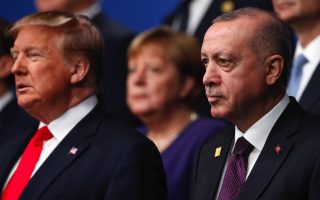Strategy update

Just like today, Greece faced Turkish provocations in 1974. Just like today, the Greek prime minister of the time turned to France. And, just like today, he secured Paris’ backing.
After dealing with it on a tactical level, Greece under Constantine Karamanlis was able to hammer out a long-term strategy which enabled the country to contain the Turkish threat. Greece’s – and, later on, Cyprus’ – accession to the European Union offset the negative balance of power vis-a-vis Turkey. Turkey was forced into a more conciliatory stance. So-called earthquake diplomacy also happened due to the fact that Greece had achieved its strategic objective.
The Greek political class has already mobilized against Turkey’s latest maneuvers. However, it also needs to carve out a long-term strategy. The Turkish provocations are not isolated moves. They are part of a bigger plan that goes back years. It has been analyzed by Ahmet Davutoglu in his 2001 book “Strategic Depth.” Subsequently, what we now see unfolding in the Eastern Aegean was heralded two decades ago. Greek strategic thinking, on the other hand, has stalled as previous arrangements fueled complacency. Attention shifted to European issues driven by a belief that European institutions would guarantee the country’s security. The present mandates an extensive review of past tactics.
In order to create a new diplomatic and strategic dogma we must first analyze the new geopolitical conditions and record the strengths and the weaknesses of Greece’s international position. But before we do all that, we need to come up with an explanation for Turkey’s behavior.
American strategy toward the Soviet Union after the end of the Second World War largely emanated from George F. Kennan’s “Long Telegram” sent from Moscow to the US secretary of state, James Byrnes. Kennan, writing under the pseudonym “Mr X,” published an outline of his philosophy, formally titled “The Sources of Soviet Conduct,” in Foreign Affairs in 1947. Containment policy and the Marshall Plan were both based on this analysis.
The combination of an ambitious hegemonic ideology and serious domestic problems and, most importantly, the connections between these two parameters explained, Kennan argued, the Soviet Union’s aggressive stance in Eastern Europe. In order to keep the lid on skepticism at home, the Soviet leadership had to create the impression the country was pursuing a higher goal. The actual or supposed undermining of this goal by the dissidents was used as an excuse for the suffering of the population and the authoritarianism exercised by the regime.
Determining Greece’s strategy first of all requires an understanding of the motives behind Turkey’s behavior. The interpretations that focus on the personality of the Turkish president are incomplete. Turkey’s hegemonic neo-Ottoman ideology, just like the internationalist-communist ideology of the Soviet Union, interplays with the internal contradictions of a society that questioned the stabilizing Kemalist legacy and institutions without however coming up with a workable substitute. The decline of the Turkish economy explains the timing of Turkey’s aggressive stance toward Greece and its political leadership. Foreign and domestic policy are interconnected to the extent that the dividing line between them is no longer clearly visible.
The second crucial issue in determining Greece’s strategy concerns Turkey’s outlook. Is it going to grow into a hegemonic power in our geopolitical region? Or is it threatened by the wave of instability which is sweeping the territories of the former Ottoman Empire? Will it evolve in a neo-imperial direction, like Putin’s Russia? Or will it plunge into turmoil like Yugoslavia under Tito or, more recently, Iraq, Syria and Libya? The answer to this question will determine whether Greece must move ahead with maneuvers and negotiations or switch into standby mode. There are arguments to support each of these assumptions.
This analysis affects all of Europe. However, Greece, being more exposed than its European peers, must play a leading role. Our partners need to understand the dual nature of the threat: Whether it is powerful and aggressive or weak and disintegrating, Turkey can be a source of major strategic upheaval. As Europe tends to underestimate the geopolitical problems in its periphery, the European center could be in for yet another surprise.
Regrettably, Greece is finding it hard to make its voice heard in the European fora where a decade of Greek crisis-related deliberations created a sense of fatigue. At this time of great need, European attention – with the exception of France maybe – is fragmented and insufficient. When it comes to geopolitics too, Greece is paying the price of its 2015 mistakes – and not only in terms of military equipment.
Professor George Prevelakis teaches geopolitics at the Pantheon-Sorbonne University in Paris.





